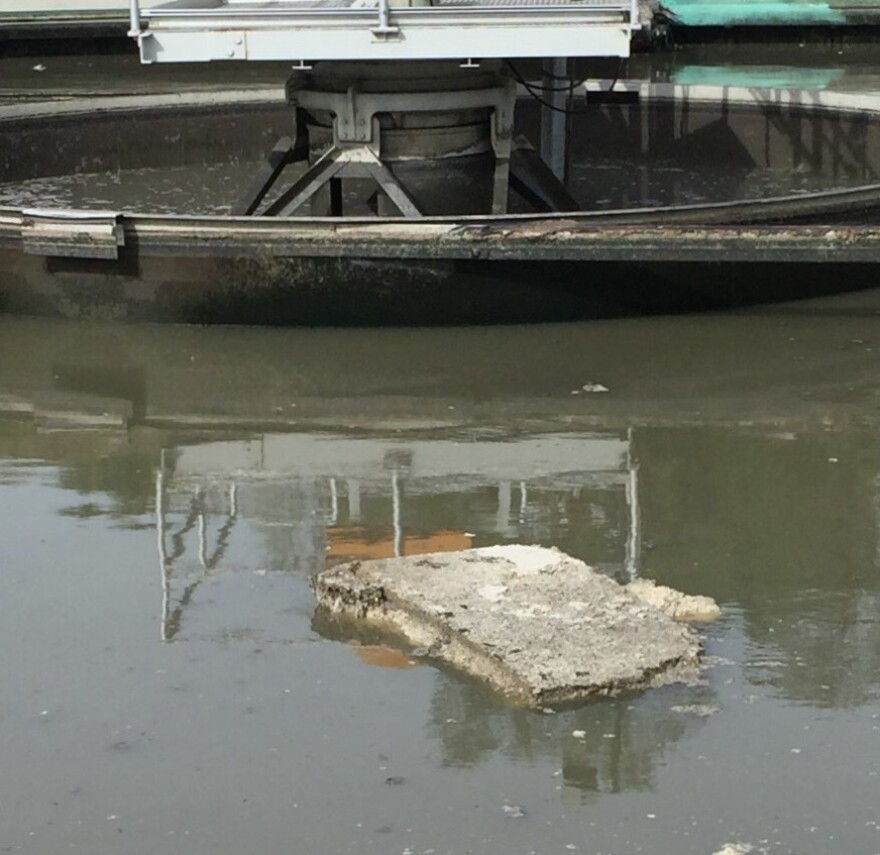EASTON, Pa. - Thanksgiving is a time for cooking. And whether you’re deep frying a turkey or pan-frying green beans, there likely will be leftover grease.
- Local officials warn residents never to pour fats, oils and grease, or FOG, into the sink because it can harden and cause blockages in pipes
- FOG can also get into the main sewer and create fatbergs, hard masses of solidified FOG that can clog up the sewer system
- Residents should also avoid putting things like ice cream, milkshakes and smoothies in the sink
One thing everyone in the kitchen needs to know is that you should never pour fats, oil and grease down the drain, according to local officials.
Alex Hoffman, assistant operations manager and industrial pretreatment manager of Easton Area Joint Sewer Authority, said people pouring fats, oils and grease down the drain is a big problem year-round.
“We see so many issues with fats oil and grease period; it would be hard to tell any increase in the holiday season."Alex Hoffman, assistant operations manager and industrial pretreatment manager of the Easton Area Joint Sewer Authority
“We see so many issues with fats oil and grease period; it would be hard to tell any increase in the holiday season,” Hoffman said.
What is FOG, and why can’t it go down the drain?
Fats, oil and grease are known as FOG in the sewage industry, according to Lehigh County Authority Communications Manager Sue Sampson. The authority handles sewage treatment in the county.
FOG are liquids when they are hot, but that changes once they cool down.
“As they cool, they congeal and become a solid. A very greasy solid,” Sampson said.
Solidified FOG can cause problems for your home’s plumbing, Sampson said. It can block entire sections of the pipes, which can result in clogged drains or other issues.
FOG also can get into the main sewer line and form what’s called a fatberg — a hard mass of solidified FOG that can clog a sewer system. Wet wipes, Q-tips and other non-flushable personal hygiene items can get mixed up into a fatberg — a play on the word iceberg — as well.

Sampson said she’s seen fatbergs that are the size of a basketball, but they can get even bigger. In 2017, London officials discovered a fatberg that officials estimated weighed the equivalent of about 143 tons.
When a sewer line is partially blocked by a fatberg, solid waste can sometimes get blocked and not be able to move through, Sampson said. If it backs up enough, it can cause odor in a neighborhood or even back up out of manholes.
In worse cases, fatbergs can cause sewers to overflow. In Baltimore, a fatberg caused a 1.2 million gallon sewage overflow into Jones Falls.
Sampson said Lehigh County Authority uses a jet truck with a powerful spray of water that can break down fatbergs, but sometimes, workers have to manually break them up.
Hoffman said Easton Area Joint Sewer Authority runs into grease-related issues almost every day. She said if people didn’t put FOG in the drain, it would help her organization focus on other issues.
“We wouldn't spend as much money and resources and manpower on dislodging and sucking out clogged lines and manholes,” Hoffman said.
“We wouldn't spend as much money and resources and manpower on dislodging and sucking out clogged lines and manholes."Alex Hoffman, assistant operations manager and industrial pretreatment manager of Easton Area Joint Sewer Authority
What else you should know
Many people know not to put leftover grease and oil from cooking down the drain, but some people don’t realize what else counts as FOG, according to Hoffman.
For example, heavy cream can solidify and become a FOG-like substance because of the amount of fat in it. Hoffman recommends never pouring any kind of fatty product down the drain, including ice cream and milkshakes.
Sampson said many people think garbage disposals will keep grease out of the plumbing system, but it doesn’t break down FOG. She recommends people put greasy foods in the trash instead of the garbage disposal.
And separate from cooking, both Hoffman and Sampson said wipes should always go in the trash, even if the container says they are “flushable.”
Hoffman said even though people might think their individual actions won’t affect the sewer systems, if everyone changes their behavior, it would have a massive impact.
“Anytime you can avoid putting [FOG] down the drain, it's beneficial to us,” Hoffman said.


